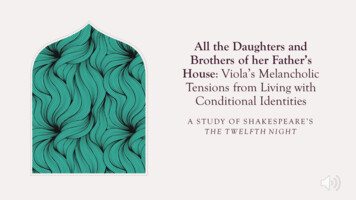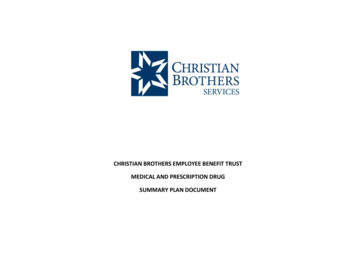
Transcription
All the Daughters andBrothers of her Father’sHouse: Viola’s MelancholicTensions from Living withConditional IdentitiesA S TU DY OF S H A K E S PE A RE ’STHE T WELFTH NIGHT
1Thesis/Methodology2Theoretical Framework3Analysis4ConclusionRoadmap
1.Thesis/Methodology
ThesisViola creates Cesario to compensate for thedeath of her brother and thus perpetuates a stateof grief that becomes her melancholyMotivation:To become closerwith Duke OrsinoTo reconstructSebastian
Methodology Film Analysis of specific scenes related to loss,love, and identity Film allows the viewer to witness non-verbalcues and facial expressions The adaptations: John Sichel (1969)Trevor Nunn (1996)
The FilmsD IR E C TE D BY J O H N S IC H E L( 19 6 9 )D IR E C TE D BY TR E VO R N U N N( 19 9 6 ) Close alignment to the original play Loose alignment to the original play Motif of looking upwards incontemplation Motif of darkness associated with heridentity Depicts Viola in a state of lovemelancholy Depicts Viola in a state of lossmelancholyViola is more reserved, rigid, andconfidentViola demonstrably expresses sadnessand anger throughout the movie
2.TheoreticalFramework
Psychoanalytic MelancholyUnderstood through Sigmund Freud’s Mourningand Melancholy (1917)Melancholy as loss of a love-object:1. Loss of object relationship2. The free libido (being newly detached) does not displace itself3. The free libido is internalized into the ego4. This libido establishes an identity of the lost object within the ego
3.Analysis
Act 1, Scene 2, Lines 3-6“And what should I do in Illyria? My brother he is in Elysium. Perchance he is not drowned.—Whatthink you, sailors?”S I C H E L A DA P TA T I O N :N U N N A DA P TA T I O N :
Act 1, Scene 2, Lines 55-58“I prithee—and I’ll pay thee bounteously— Conceal me what I am, and be my aid For such disguiseas haply shall become The form of my intent. I’ll serve this duke.”S I C H E L A DA P TA T I O N :N U N N A DA P TA T I O N :
Act 2, Scene 2, Lines 25-32“I am the man. If it be so, as ’tis, Poor lady, she were better love a dream. Disguise, I see thou arta wickedness.Alas, our frailty is the cause, not we, For such as we are made of, such we be.”S I C H E L A DA P TA T I O N :N U N N A DA P TA T I O N :
Act 2, Scene 2, Lines 36-39“As I am man, My state is desperate for my master’s love. As I am woman (now, alas the day!),What thriftless sighs shall poor Olivia breathe!”S I C H E L A DA P TA T I O N :N U N N A DA P TA T I O N :
Act 2, Scene 4, Lines 122-133“I am all the daughters of my father’s house, And all the brothers, too ”“She never told her love, But let concealment, like a worm i’ th’ bud, Feed on her damask cheek.She pined in thought, And with a green and yellow melancholy ”S I C H E L A DA P TA T I O N :N U N N A DA P TA T I O N :
Act 3, Scene 4, Lines 393-396“Methinks his words do from such passion fly That he believes himself; so do not I. Prove true,imagination, O, prove true, That I, dear brother, be now ta’en for you!”S I C H E L A DA P TA T I O N :N U N N A DA P TA T I O N :
Act 5, Scene 1, Lines 245-261“So went he suited to his watery tomb. If spirits can assume both form and suit, You come to frightus.” (Lines 245-247)“If nothing lets to make us happy both But this my masculine usurped attire, Do not embrace me tilleach circumstance Of place, time, fortune, do cohere and jump That I am Viola ” (Lines 261-265)S I C H E L A DA P TA T I O N :N U N N A DA P TA T I O N :
4.Conclusion
Insights into the StoryInternalization (Viola’s Motivation) Sichel Adaptation: to primarily gain access to Duke OrsinoNunn Adaptation: to revive and maintain her brotherCritical Agency (Projected Self-Loathing) Anger directed at Orsino for his love of OliviaCriticism/mockery of Olivia for her naiveteMelancholic Tension (Extrinsic Regulation) Conditional existence: Viola is a man to Olivia and theDuke, but internally she understands Olivia’s positionand feels attraction for Duke Orsino as a woman
Sebastian's ReturnViola sustains her disbelief of Sebastian inNunn’s adaptation Only when Sebastian removes her fakemustache does she accept him as “Sebastian” Cesario and Sebastian could notsimultaneously exist; the former stands in forthe latter Is this a true resolve or a subsequent objectloss?
References Claret, Jean-Louis. “When the bear won't go hunt”: masculinity in Shakespeare's Twelfth Night." E-rea. Revue électroniqued’études sur le monde anglophone 10.1 (2012). Doblas, María del Rosario Arias. "Gender Ambiguity and Desire in Twelfth Night7." Through the Literary Glass: ACollection of Articles on Select Prose and Plays (2017): 28. Evans, Stephen, et al. Twelfth Night, or, What You Will. Distributed by Image Entertainment, 2005, 1996. Margo, M. & Douglas, M. Reflections on Sex, Shakespeare and Nostalgia in Trevor Nunn’s Twelfth Night. Pluto Press, 2001. Van Wagenberg-Ter Hoeven, Anke A. "The celebration of twelfth night in Netherlandish art." Simiolus: Netherlands Quarterlyfor the History of Art (1993): 65-96.Freud, S. Mourning and Melancholia. The Standard Edition of the Complete Psychological Works of Sigmund Freud, VolumeXIV, 1917.MacClain, Alexia. “Twelfth Night Traditions: A Cake, a Bean, and a King.” Smithsonian Libraries and Archives. 2013.Sichel, John, et al., directors. William Shakespeare's Twelfth Night. Network, 1969. Shakespeare, William. Twelfth Night, orWhat You Will. Ed. Barbara Mowat & Paul Werstine. Folger Shakespeare Library. Print, 2019.
Understood through Sigmund Freud's Mourning and Melancholy (1917) Melancholy as loss of a love-object: 1. Loss of object relationship 2. The free libido (being newly detached) does not displace itself 3. The free libido is internalized into the ego 4. This libido establishes an identity of the lost object within the ego











